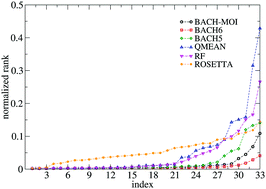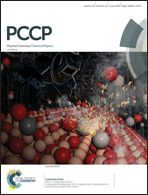Toward a unified scoring function for native state discrimination and drug-binding pocket recognition†
Abstract
Protein folding and receptor–ligand recognition are fundamental processes for any living organism. Although folding and ligand recognition are based on the same chemistry, the existing empirical scoring functions target just one problem: predicting the correct fold or the correct binding pose. We here introduce a statistical potential which considers moieties as fundamental units. The scoring function is able to deal with both folding and ligand pocket recognition problems with a performance comparable to the scoring functions specifically tailored for one of the two tasks. We foresee that the capability of the new scoring function to tackle both problems in a unified framework will be a key to deal with the induced fit phenomena, in which a target protein changes significantly its conformation upon binding. Moreover, the new scoring function might be useful in docking protocols towards intrinsically disordered proteins, whose flexibility cannot be handled with the available docking software.



 Please wait while we load your content...
Please wait while we load your content...